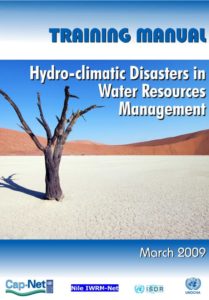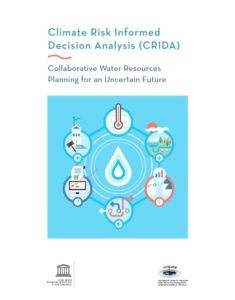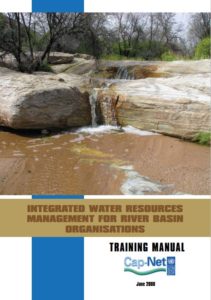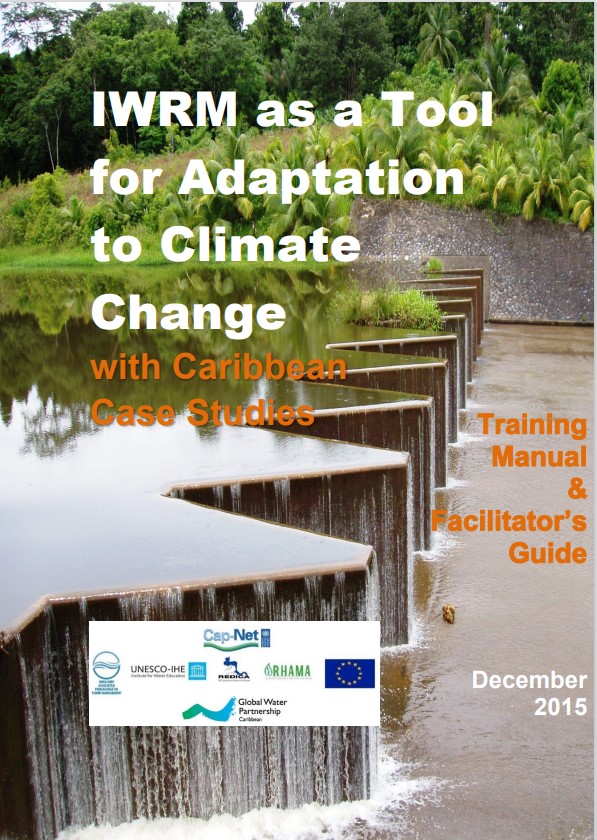Water is the first sector to be affected by changes in climate. Climate change leads to an intensified hydrological cycle. Sea level rise, increased evaporation, unpredictable precipitation, and prolonged droughts are just a few extreme events impacting availability and quality of water.
Integrated Water Resources Management (IWRM) tools assist communities to cope with climate variability by managing available resources, organising and developing good management policy and practices, and placing focus on the most vulnerable groups.
In 2001, the Intergovernmental Panel on Climate Change (IPCC) recognised the potential of IWRM to be used to reconcile changing water uses and demands, as it offers greater flexibility than conventional water resources management approaches.
IWRM for sustainable development
In January 1992, the International Conference on Water and the Environment (ICWE) in Dublin produced four principles that have been the basis for subsequent water-sector reforms, known as The Dublin Principles.
The Dublin Principles
1) Fresh water is a finite and vulnerable resource, essential to sustain life, development and the environment.
2) Water development and management should be based on a participatory approach, involving users, planners and policymakers at all levels.
3) Women play a central part in the provision, management and safeguarding of water.
4) Water has an economic value in all its competing uses and should be recognized as an economic good as well as a social good.
Understanding the science of climate change
Water managers need to understand the physical science and drivers of climate change before looking into its impact on water resources and ecosystems, and how this may affect water use.
Climate change effects on water
In 2016. the United Nations Office for Disaster Risk Reduction (UNISDR) estimates that climate-related disasters have caused US$1.4 trillion of damage worldwide in the previous decade. In recent years, water-related disasters (floods, droughts and windstorms) accounted for almost 90 percent of the most disastrous events.

Featured Resource
Hydroclimatic Disasters in Water Resources Management Training Manual
A training material to help water managers develop strategies for coping with hydro-climatic disasters such as floods and drought.
IWRM for Climate Change Adaptation
The IPCC report recommends that reducing the vulnerability of nations or communities to climate change requires an increased ability to adapt to its effects. Tailoring adaptation assistance to local needs requires the addressing real vulnerabilities, involving stakeholders early and meaningfully and connecting with local decision-making processes.

Featured Resource
Climate Risk Informed Decision Analysis
Collaborative Water Resources Planning for an Uncertain Future
How can IWRM help address climate change?
IWRM offers various tools and instruments that deal with access to water and protecting the ecosystem, which safeguards water quality for future generations. IWRM can assist communities to plan for changing climatic conditions that limit water availability or cause excessive floods or droughts.
"Integrated water resources management is an increasingly
used means of reconciling different and changing water uses
and demands, and it appears to offer greater flexibility than
conventional water resources management. Improved ability
to forecast streamflow weeks or months ahead also would
significantly enhance water management and its ability to
cope with a changing hydrological variability."
Six Water Resource Management Planning Activities for Climate Change Mitigation
IWRM can assist communities to adapt to changing climatic conditions that limit water availability or may lead to excessive floods or droughts through:
Water allocation
Water can be allocated to the most efficient and effective use to react to climate variability in a flexible manner.
Water Integrity Training Manual
Pollution control
Water managers can proactively take action towards adaptation, by monitoring water quantity and quality developments.
Water Pollution Management Training Manual
Financial management
Creating the investment structures and securing the funding to meet water needs is a key enabling factor in achieving sustainable, climate-resilient and responsive water governance.
Economics in Sustainable Water Management Training Manual
Flood and drought management
Management of floods and droughts, as a key function of IWRM, allows for direct intervention in cases of extreme events.
Drought Risk Reduction in Integrated Water Resources Management Training Manual
Integrated Urban Flood Management Training Manual
Watershed planning
Risk assessment and adaptation measures can be incorporated in watershed planning so as to mitigate against the combined effects of extremes in climate variability and unsustainable land management practices
Stakeholder participation.
When action is needed, stakeholder participation helps to mobilise communities and generate action. Water users can be stimulated to use the resource sustainably in the face of changing water conditions.

Featured Resource
Integrated Water Resources Management for River Basin Organisations
Related Courses
Get started on IWRM planning with the following courses:
More Resources

Text Excerpts taken from
